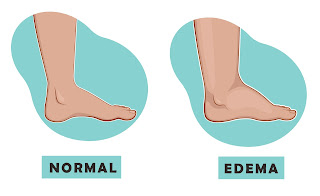SWELLING IN FEET OR PEDAL EDEMA
CAUSES
Swelling in feet is most often due to the development of edema. Edema is defined as a palpable swelling produced by
excess accumulation of the fluid in the tissue. If such accumulation occurs in the leg, it is called pedal edema. Then the patient reports swelling in feet.
At least 2.5 to 3 L of excess fluid in the body is required to notice swollen legs and feet, it means any noticeable swelling of the limb indicates an accumulation of more than 3 liters. Hence edema is accompanied by weight gain. The weight of a person increases before pedal edema manifests.
Types of Edema
Edema is two types pitting and non-pitting.
Pitting edema is more common than non-pitting Edema. Tissue depresses when pressure is applied to the edematous area in pitting edema whereas this does not happen with non-pitting edema.
Non-pitting edema is relatively rare and is usually indicates lymphatic obstruction or hypothyroidism.
Edema can be two types based on laterality. they are
1. Unilateral
2. Bilateral
Now we will be discussing all of them one by one.
Sudden onset one leg swelling
If you notice sudden swelling of one leg, you might be having any of the following problems. The most common cause for sudden leg swelling is clots in the leg veins (DVT).
1. DVT or clots in the leg veins
Apart from swelling of affected lib due to edema, the patient reports pain in the leg. Redness can occasionally
be seen on the affected leg. The temperature of the affected leg is often raised.
D-dimer is a blood test that helps in the diagnosis of DVT. An ultrasound test with Doppler is required to confirm the
diagnosis, it reliably identifies the clot in the leg veins
2. Muscle strain, tear, or twisting injury to the leg
A second most common cause for sudden onset painful swelling of one leg
3. Calf muscle tear or strain
An injury to the leg especially in the calf area is often reported by the patient before the development of selling of the affected leg. It is a painful swelling and the patient winces on touch
4. Cellulitis
Another most common cause of single-leg swelling is cellulitis. This is sudden in onset, swelling is accompanied by
pain, redness, and warmth. the superficial layer of the leg is infected by bacteria in cellulitis. Fever is often present.
5. Popliteal (Baker’s) cyst rupture
The patient reports knee pain, knee stiffness, and swelling of the knee in a case of Popliteal (Baker’s) cyst rupture.
Gradual onset swollen foot and ankle on one side
The most common cause is chronic venous disease of a leg. Valves of leg veins become dysfunctional
and are not able to prevent backflow of venous outflow. Hence fluid accumulates in the affected leg gradually. The skin develops pigmentary changes and ulcerations.
1. Lymphedema
Groin lymph node removal surgery or radiation therapy in the groin area leads to damage of lymphatic drainage. The edema is initially pitting but becomes non-pitting afterward. It occurs in patients suffering from cancer in the lower abdomen. Cancer of the ovary, cancer of the prostate, and cancer of the uterus are a few cancers in the lower abdomen. If
the patient undergoes surgery or radiation therapy for the same, he may develop swelling of feet due to lymphedema.
Sudden onset of both legs edema or bilateral edema or swollen feet on both the sides
It has many causes, a few of them are
● It can be a Side effect of medications.
● It can be because of a heart problem (heart failure).
● Protein loss through the kidney can also present in this manner Acute nephrotic syndrome.
● DVT on both legs.
You are often advised to undergo a 2d echo test, urine analysis for protein, and d-dimer blood test to know the exact cause.
Gradual onset of both legs edema
Chronic venous disease is the most common cause of chronic swelling of feet on both the sides. Heart diseases are other common causes of swollen ankles and feet on both the sides.
Even following diseases can also cause both legs to swell.
1. Renal disease
2. Liver disease
3. Cancers of the lower abdomen
4. Constrictive pericarditis
5. Idiopathic edema
6. Premenstrual Edema
7. Malnutrition
8. Thyroid issues
9. Myxedema
10. Heart failure or congestive heart failure (CHF)
Before conclusion, a brief note about myxedema.
Myxedema
It is non-pitting edema of feet. It affects both legs. It is gradual in onset and is painless swelling. It is seen in thyroid-related diseases.







